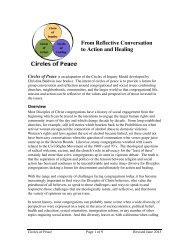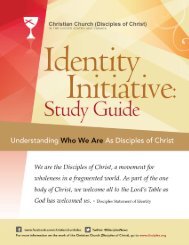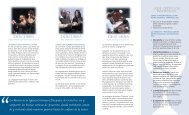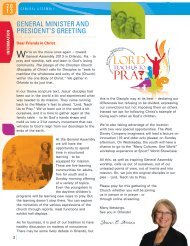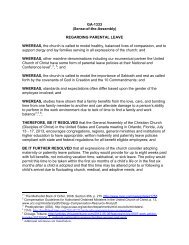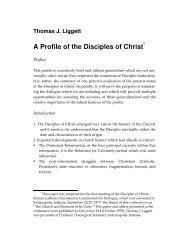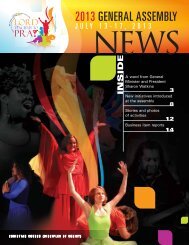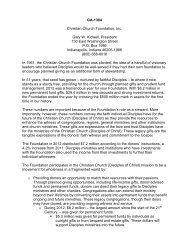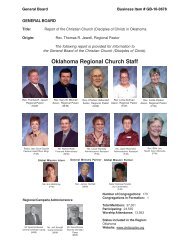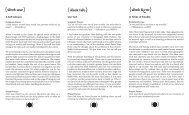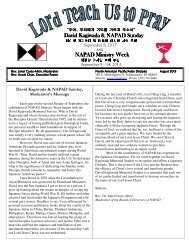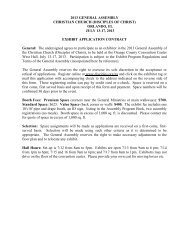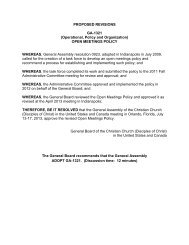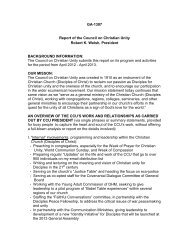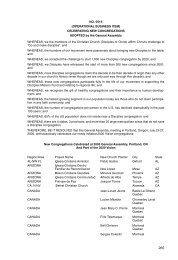RESOURCING THE CHURCH FOR ECUMENICAL MINISTRy A ...
RESOURCING THE CHURCH FOR ECUMENICAL MINISTRy A ...
RESOURCING THE CHURCH FOR ECUMENICAL MINISTRy A ...
You also want an ePaper? Increase the reach of your titles
YUMPU automatically turns print PDFs into web optimized ePapers that Google loves.
persons remains particularly relevant in our time<br />
when global divides of strength, health, wealth, and<br />
power are sharply drawn.<br />
For Luther, “under the cross” is the place<br />
where Christians are united in evident<br />
faith and in their vulnerability to pain<br />
and destruction.<br />
For Luther, “under the cross” is the place where<br />
Christians are united in evident faith and in their<br />
vulnerability to pain and destruction. He accented<br />
the paradoxical nature of Christianity in which<br />
God’s glory is hidden in the cross and essentially<br />
invisible on earth. Unfortunately, Luther tended to<br />
trust inwardness and invisibility in themselves and<br />
to denigrate visible and material expressions of faith<br />
as such. 5<br />
By contrast, John Calvin employed the distinction<br />
between visible and invisible church to aid believers<br />
in keeping communion with the church they could<br />
see. According to Calvin, the church’s foundation<br />
in divine election may be primarily invisible, but its<br />
ministry and purpose are primarily visible.<br />
Initiation into its membership is by baptism; its<br />
unity in doctrine and love is attested to by the Lord’s<br />
Supper; and its ministry is preserved in the<br />
preaching of the Word. This visible church is far<br />
from perfect: Its divinely instituted ministry exists<br />
in history and is susceptible both to corruption and<br />
to correction.<br />
Calvin viewed the Christian life as a strenuous,<br />
engaged life. In contrast to Luther’s paradoxical<br />
stance, Calvin depicted a transformative faith<br />
engaged in history. “The church’s holiness is not yet<br />
complete,” Calvin taught. The church is holy in that<br />
God is “daily at work” in it and “in the sense that it<br />
is daily advancing.” 6 Christians dwell in the midst of<br />
life’s complexities, vulnerabilities, and ambiguities,<br />
not on the edge of the world. Christians should rely<br />
on God’s mercy, give glory to God, name ignorance<br />
and falsehood for what it is, acknowledge their own<br />
vulnerability and ambiguity, and strive to transform<br />
lives and institutions toward the glory of God.<br />
The gap that Calvin saw between divine glory and<br />
creaturely existence often called forth a practical<br />
responsiveness. And more, it called forth venturesome<br />
Christians who lived out their faith in the<br />
midst of a world that was a theater of God’s glory,<br />
albeit one distorted by corruption and idolatry.<br />
31<br />
Many of these followers grew impatient with<br />
falsehood and injustice and became uncompromising<br />
agents of change. They understood their<br />
worship of the God of grace and glory to entail the<br />
possibilities of transformed ecclesial, cultural,<br />
political, and economic life toward greater<br />
goodness, truth, and justice. But other followers of<br />
Calvin focused on the fear of God and their own<br />
vulnerability, and negotiated the gap between<br />
creaturely existence and God’s glory by creating and<br />
submitting to authoritarian religious and political<br />
regimes. At our best, Disciples exemplify the former<br />
practical responsiveness; at our worst, Disciples’<br />
focus on unity can function to suppress not only<br />
divisions and diversity, but also responsibility for<br />
transformation.<br />
The gap between God’s glory and creaturely existence<br />
is no less evident in our day. Globalization does not<br />
alleviate the shared human plight about which Paul<br />
and other theologians have been writing for<br />
centuries: human creatures now assimilate idolatries<br />
by megabytes and gigabytes; we consume tyrannies<br />
with how we eat, work, and live; we transact them in<br />
the global marketplace and suffer them in globalized<br />
risks and damage. To somehow secure our own lives<br />
from the ravages that others suffer—a sectarian<br />
option—is not a real option: persons are already<br />
intricately and globally interconnected. For example,<br />
cell phones allow communication with persons<br />
around the world; they also connect their users to the<br />
Congo, from whence comes eighty percent of the<br />
mineral that allows the phones to hold an electrical<br />
charge, but where rural Congolese themselves cannot<br />
afford the technology and where exploitation and<br />
rape accompany international looting of mineral<br />
resources. 7<br />
The deadly effects of contemporary idolatries are<br />
seen in places where the basic goods of life cannot<br />
be taken for granted, where constant vigilance is<br />
required to keep a child safe from violence and wellenough<br />
fed, where decent housing can be neither<br />
afforded nor found, where access to minimal health<br />
care or education cannot be assumed, where the lack<br />
of hope numbs minds and spirits. The effects of our<br />
day’s idolatries also cut across relative privileges.<br />
They are seen in interpersonal abuse and violence,<br />
substance abuse, ragged relationships, lack of viable<br />
common life, contaminated food and water and air,<br />
and relative inability to access or affect political<br />
processes.<br />
However, it is not only shared harm and pain that<br />
unite human creatures. The unity of humanity<br />
Culp • Christian Unity, Prophetic Witness, and the Unity of Humanity



